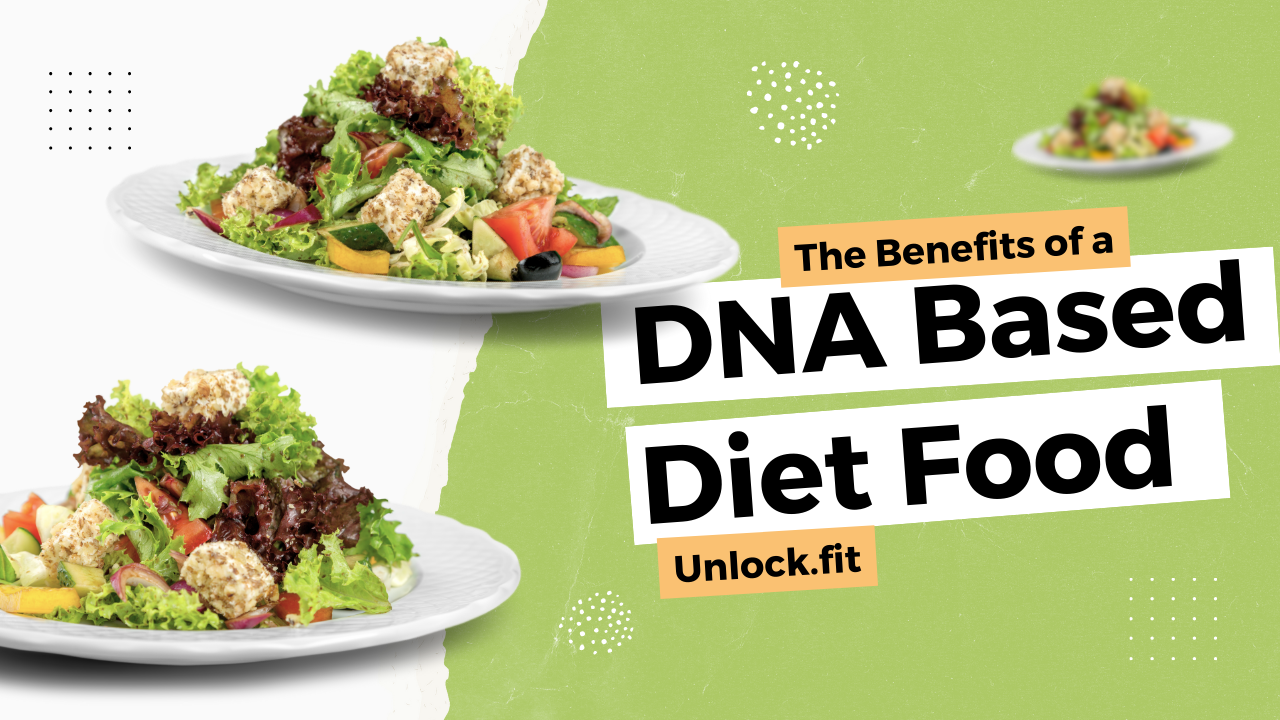The Benefits of a DNA based Diet – From Genes to Plates

Are you tired of trying endless diets that promise incredible results but fail to deliver? It’s time to unlock the secret to personalized nutrition with a DNA based diet. By analyzing your unique genetic makeup, this innovative approach to eating can help you make informed choices about the foods that suit you best.
The concept behind a DNA based diet is simple: our genetic code holds valuable information about how our bodies process and react to different nutrients. By identifying our genetic variations, experts can tailor a diet plan that optimizes our health and well-being.
Imagine never having to guess which diet or eating plan is right for you again. With a DNA based diet, you can say goodbye to trial and error methods and hello to a customized nutrition approach that supports your individual needs. Whether you’re looking to shed those stubborn pounds, boost your energy levels, or enhance your overall health, a DNA based diet can provide the answers you’ve been searching for. Get ready to revolutionize the way you eat and embrace the power of personalized nutrition.
How DNA based diets work!
A DNA based diet relies on the understanding that our genetic makeup influences how our bodies digest, metabolize, and respond to different nutrients. It takes into account the genetic variations that affect our ability to process macronutrients such as carbohydrates, fats, and proteins, as well as micronutrients like vitamins and minerals.
By analyzing specific genes related to metabolism, appetite, and nutrient absorption, scientists can create a comprehensive profile of an individual’s genetic predisposition to certain dietary requirements. This information is then used to design a personalized diet plan that maximizes nutritional benefits and minimizes potential health risks.
DNA based diets typically involve a two-step process: genetic testing and personalized recommendations. Genetic testing can be done through a simple saliva sample, which is then analyzed to identify specific genetic variations. Once the results are obtained, experts interpret the data to provide personalized dietary recommendations tailored to an individual’s genetic profile.
Benefits of DNA based diets
One of the key benefits of a DNA based diet is the ability to optimize your nutritional intake based on your unique genetic makeup. Unlike generic diet plans that are designed for the masses, a DNA based diet is customized to meet your specific needs. By understanding how your body processes different nutrients, you can make informed choices about the foods that are best suited for you.
Another advantage of DNA based diets is their potential to improve weight management. Research has shown that individuals following a genetically tailored diet are more likely to achieve sustainable weight loss compared to those on traditional diets. This is because a DNA based diet takes into account factors such as appetite regulation and metabolism, which play a crucial role in weight management.
In addition, DNA based diets can help optimize overall health and well-being. By identifying genetic variations related to nutrient absorption and metabolism, a personalized diet plan can ensure that you’re getting the right balance of essential nutrients. This can lead to improved energy levels, reduced risk of chronic diseases, and enhanced overall vitality.
Scientific evidence supporting DNA based diets
While the concept of DNA based diets may seem revolutionary, it is firmly rooted in scientific research. Numerous studies have demonstrated the effectiveness of personalized nutrition based on genetic information.
For example, a study published in the New England Journal of Medicine found that participants who followed a genetically tailored diet lost more weight compared to those on a standard diet. Another study published in the Journal of the American Medical Association showed that individuals who received genetically tailored dietary advice had greater improvements in their cholesterol levels compared to those on a standard diet.
These studies, along with many others, provide compelling evidence that DNA based diets can have a significant impact on weight management and overall health. While further research is still needed to fully understand the intricacies of genetic variations and their interaction with diet, the existing evidence is promising and supports the use of DNA based diets as a valuable tool in personalized nutrition.
Understanding your genetic makeup for personalized nutrition
To fully embrace the benefits of a DNA based diet, it’s essential to understand your genetic makeup and how it influences your nutritional needs. Genetic testing is the first step in this process, as it provides valuable insights into your unique genetic variations.
Genetic testing can be done through various methods, including at-home DNA testing kits or through healthcare professionals specializing in personalized nutrition. These tests typically analyze specific genes related to metabolism, nutrient absorption, and other factors that impact dietary requirements.
Once you have your genetic test results, it’s important to work with a qualified professional who can interpret the data and provide personalized dietary recommendations. This can include guidance on macronutrient ratios, portion sizes, food choices, and even information on how your genetic variations may affect your response to certain dietary interventions.
By understanding your genetic makeup, you can make informed decisions about the foods that support your individual needs and optimize your overall health and well-being.
Creating a DNA based diet plan
Creating a DNA based diet plan involves a combination of genetic information and expert guidance. Once you have your genetic test results, a qualified professional can analyze the data and provide personalized recommendations tailored to your genetic profile.
These recommendations may include specific dietary guidelines such as macronutrient ratios, portion sizes, and food choices that align with your genetic variations. For example, if your genetic profile indicates a higher risk of insulin resistance, your diet plan may focus on balancing carbohydrates and optimizing insulin sensitivity.
It’s important to note that a DNA based diet plan is not a one-size-fits-all solution. Each individual’s genetic makeup is unique, and therefore, their dietary recommendations will be personalized accordingly. Regular follow-ups with a qualified professional are essential to monitor progress, make adjustments as needed, and ensure that the diet plan continues to support your health goals.
Common misconceptions about DNA based diets
As with any innovative approach, there are common misconceptions surrounding DNA based diets. One of the most prevalent misconceptions is that DNA based diets are solely focused on weight loss. While weight management is one aspect that can be addressed through personalized nutrition, DNA based diets offer a much broader range of benefits.
Another misconception is that DNA based diets are overly restrictive or complicated. In reality, a DNA based diet is designed to provide personalized recommendations that fit seamlessly into your lifestyle. It’s not about eliminating entire food groups or following strict rules but rather making informed choices based on your genetic makeup.
It’s also important to note that DNA based diets are not a magic solution that guarantees instant results. Like any dietary approach, they require commitment, consistency, and patience. It’s a long-term investment in your health that can yield significant benefits over time.
Success stories and testimonials
The power of DNA based diets is best illustrated through the success stories and testimonials of individuals who have embraced this personalized approach to nutrition. Many people have reported significant improvements in their overall health, energy levels, and weight management after following a DNA based diet.
For example, Sarah, a 40-year-old working professional, struggled with weight management for years. She had tried various diets without sustainable results. After undergoing genetic testing and receiving personalized dietary recommendations, she was able to lose weight and maintain it effortlessly. She credits her DNA based diet for providing her with the knowledge and tools to make informed choices about her nutrition.
John, a 55-year-old retiree, had always suffered from digestive issues and food sensitivities. After discovering his genetic variations related to nutrient absorption, he made targeted changes to his diet and noticed a significant improvement in his symptoms. He now enjoys a wide variety of foods without experiencing discomfort or digestive distress.
These success stories highlight the transformative potential of DNA based diets and the positive impact they can have on individuals’ lives.
Other factors to consider for a healthy lifestyle
While a DNA based diet can provide personalized recommendations, it’s important to remember that nutrition is just one aspect of a healthy lifestyle. Other factors, such as physical activity, stress management, sleep, and overall lifestyle choices, also play a crucial role in overall health and well-being.
Incorporating regular exercise into your routine can complement your DNA based diet by promoting weight management, boosting energy levels, and improving cardiovascular health. Finding stress management techniques that work for you, such as meditation or yoga, can further enhance your overall well-being.
Adequate sleep is another crucial component of a healthy lifestyle. Poor sleep can disrupt hormonal balance, increase cravings, and negatively impact metabolism. Prioritizing quality sleep can support the effectiveness of your DNA based diet and contribute to better overall health.
Lastly, it’s essential to make sustainable lifestyle changes that are realistic and enjoyable for the long term. While a DNA based diet can provide valuable insights and guidance, it’s up to you to implement and maintain these changes in your daily life.
Conclusion: The future of DNA based diets
The concept of a DNA based nutrition (diet) has the potential to revolutionize the field of nutrition and personalized health. By harnessing the power of our genetic makeup, we can make informed choices about the foods that support our individual needs.
While DNA based diets are still a relatively new field, the scientific evidence supporting their effectiveness continues to grow. As more research is conducted and technology advances, we can expect to see even greater precision and accuracy in personalized nutrition.
However, it’s important to approach DNA based diets with a balanced perspective. While they offer valuable insights, they are not a magic solution or a replacement for a healthy lifestyle. They are a tool that can complement other aspects of a holistic approach to health and well-being.
So, if you’re tired of the trial and error approach to diets and want a personalized nutrition plan that’s tailored to your genetic makeup, a DNA based diet may be the answer you’ve been searching for. Unlock the power of your genes and embark on a journey towards optimized health and well-being. The future of nutrition is here, and it starts from our genes to our plates.


